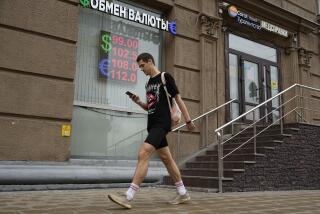Dollar Slips Again to New Postwar Low Against Yen : Currency: Bank of Japan steps in to halt the slide, while the Japanese stock market tumbles on dismal outlook for exports.
- Share via
TOKYO — The U.S. dollar fell to a new post-World War II low of 88.68 yen in the Asian foreign currency market early today, battering the Japanese stock market’s Nikkei 225 index under 16,000 points for the first time since 1993.
Strong buying from the Bank of Japan propped the dollar back up but traders doubted there would be a sustained effect, and with two hours left in the trading session, the Nikkei drifted back up to 16,133 but was still down 118 for the day.
The continued strength of the yen and the German mark against the dollar and other currencies is raising renewed concerns that the European Union’s exchange rate mechanism could break up, threatening the prospect of a single European currency.
On Sunday, Jacques Santer, president of the European Commission, called on the Group of Seven leading industrialized countries to recreate an international system for coordinated intervention to avert upheaval in the currency markets.
Speaking after a meeting of EU foreign ministers in France, Santer said that a mechanism for intervention was needed, similar to the 1980s Plaza Accord.
In recent weeks a flight toward safe-haven currencies has left the dollar and most European currencies at new lows against the German mark. That has prompted concerns about the currency arrangements within Europe and speculation that Spain might be forced to leave the mechanism.
Portugal and Spain have already devalued in recent weeks.
The dollar fell against most currencies in New York on Friday as the German mark jumped to record highs against the British pound, Italian lira and Spanish peseta. The mark’s move reflected the Bundesbank’s decision not to lower interest rates on Thursday.
Japanese stocks suffered early today as the stubborn strength of the yen threatened Japan’s big exporters.
Japanese stock traders said concerns about selling by corporate investors and the effect of January’s earthquake in Kobe also weighed on the market.
“As the yen strengthens, the earnings of those exporting companies are just being ruined,” said Mike Young, a principal with the Seattle-based Pacific Futures Trading company.
Traders and analysts say the dollar could rebound if the U.S. raises its interest rates while Germany and Japan cut theirs. But the central banks appear unlikely to make such moves in concert.
More to Read
Sign up for Essential California
The most important California stories and recommendations in your inbox every morning.
You may occasionally receive promotional content from the Los Angeles Times.













